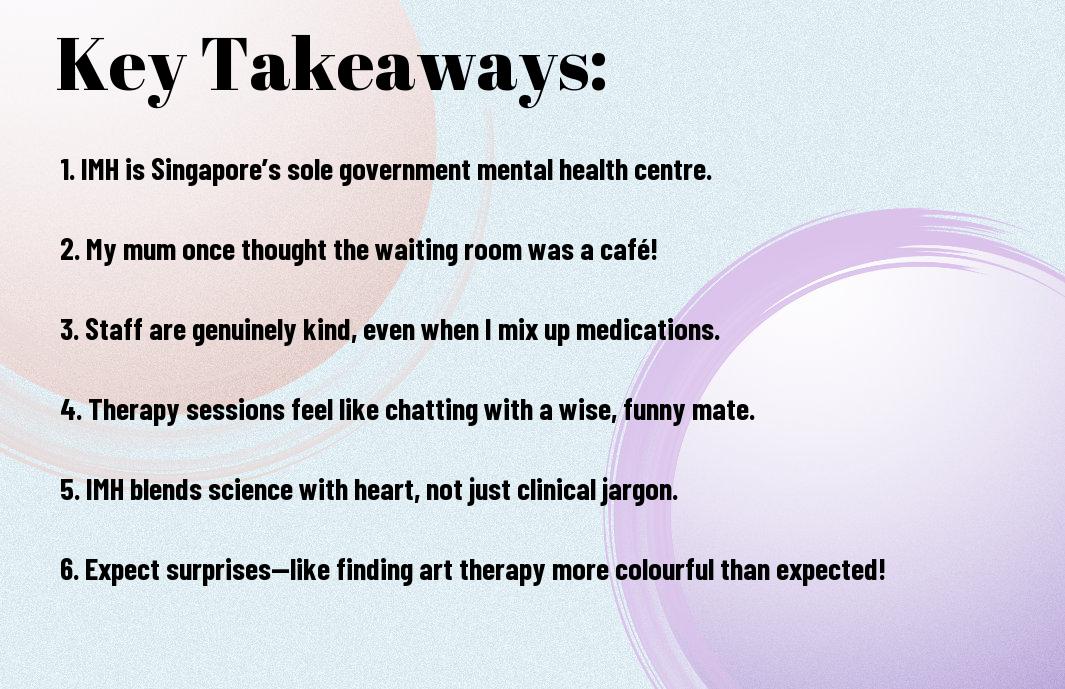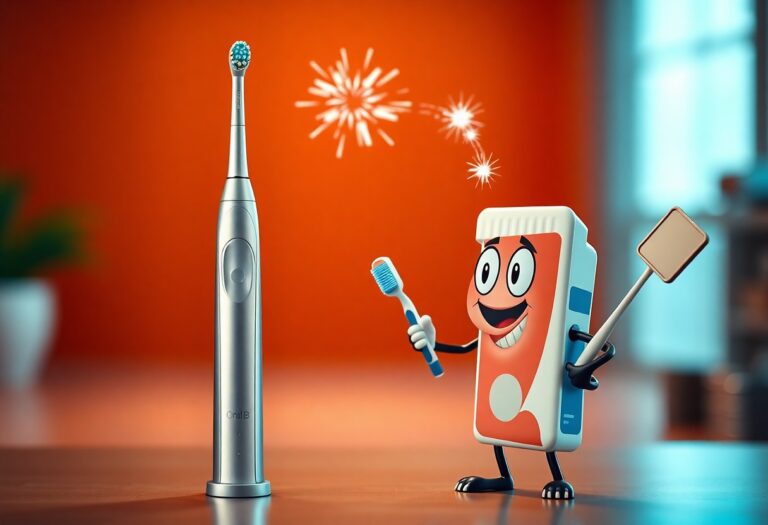Just when I thought I’d seen it all at the Institute of Mental Health (IMH), life decided to throw me a curveball that had me laughing instead of worrying. You see, navigating the corridors of IMH is like stepping into a circus – a very supportive circus, filled with professionals who probably haven’t had their coffee yet and a few unexpected animal encounters – metaphorically speaking, of course! Join me as I share my somewhat amusing and eye-opening journeys through the quirks and perks of Singapore’s only government-run mental health facility.
Key Takeaways:
- The Institute of Mental Health (IMH) is not just a place for people wearing socks with sandals; it’s a serious establishment tackling mental health issues in Singapore. It reminded me of my university days when I had to prance about the campus with my brain on the edge of meltdown during exams – and yes, those socks were indeed worn, but I assure you they were fashionable!
- The IMH has undergone significant transformations recently, much like how I transformed my physique into that of a couch potato during the last lockdown. They are improving their services and facilities, ensuring that mental health care is as accessible as a takeaway pizza on a Friday night.
- There’s a clear emphasis on community outreach, which got me thinking about how I can successfully engage with my neighbours. I mean, if they can organise activities to raise awareness about mental health, I can probably muster the courage to ask them how they keep their hedge so neatly trimmed. It’s all about connections!
- Public stigma surrounding mental health is still a major hurdle, akin to trying to jump over a puddle while wearing flip-flops. My personal experience with mental health discussions often leads to awkward silences reminiscent of first dates gone wrong. We need to openly chat about these issues without the pitiful glances.
- Finally, IMH provides a range of services, catering to everyone – even those of us who may have accidentally sent a ‘sorry, wrong person’ text to our therapist instead of our mate about our questionable life choices. They’re committed to ensuring no one feels isolated in their struggles, which is reassuring on days I binge-watch shows in my pyjamas.

A Brief History of Mental Health in Singapore
Before the 1960s, mental health was often shrouded in stigma and, let’s be honest, a fair bit of misunderstanding in Singapore. People were tucked away in institutions like they were part of an antiquated magic trick, and society preferred to look the other way. Over the decades, though, perspectives shifted, leading to the establishment of facilities like the Institute of Mental Health, which helped pave the way for greater awareness and compassion for those battling mental health challenges.
Unpacking the Journey
Before we can appreciate where we are, let’s have a quick gander at how far we’ve come. The early days of mental health care in Singapore felt a lot like an awkward family dinner—you know, where no one really wants to address that one uncle who keeps making inappropriate jokes about “crazy people”. Thankfully, times have changed, and we’ve started having more open conversations about mental well-being.
The Role of IMH
For me, the Institute of Mental Health stands as a symbol of optimism amid all the struggles surrounding mental health. Here, experts work diligently, and anyone looking for help can find resources that truly make a difference to their journey. The IMH has transformed into a safe space where people can seek guidance without the fear of judgement; it’s like finding a supportive friend at a particularly awkward gathering.
Journeying through the mental health landscape at IMH offers not only professional support but also a sense of community. The IMH has made substantial progress towards improving mental health awareness in Singapore. Their workshops and public campaigns serve as a gentle reminder to those who are still struggling with mental health issues—’Hey!’ It’s alright to talk about it!’ Having been there personally, I find that the blend of clinical expertise and genuine care is what sets IMH apart, reassuring us that we’re not alone on this sometimes unpredictable ride called life.
What to Expect When Visiting IMH
There’s a unique atmosphere about the Institute of Mental Health (IMH) that can be both comforting and slightly intimidating. Expect a blend of professional care and understanding that can help you feel at ease. Whether you’re visiting for a consultation, therapy session, or just a friendly chat, know that the staff are there to support you every step of the way.
First Impressions: Walking Through the Doors
Below the gleaming façade and manicured gardens, stepping through the doors of IMH might feel like entering a different world. The reception area instantly welcomes you with friendly faces and soft tones – perhaps a bit like being wrapped in a giant, warm hug, but without the awkwardness of an unsolicited embrace.
A Day in the Life at IMH
Through my visits, I discovered that a typical day at IMH is quite the experience. From the moment I arrived, I could feel a mix of emotions swirling around me – excitement, nervousness, and even a dash of humour as I tried to navigate the vast corridors, which seemed to have a magical way of leading me in circles!
Consequently, each interaction is a blend of professionalism and compassion. The staff really take the time to listen, often employing a touch of wit to lighten the mood. I recall one psychiatrist showing me how to juggle stress by actually tossing a couple of stress balls around! Overall, my days spent at IMH were filled with insightful conversations, unexpected laughter, and a refreshing sense of community. It’s a place where you can learn to embrace your quirks with a smile and leave feeling a bit lighter than when you walked in.
Personal Experiences: My Journey with Mental Health
Despite the ups and downs that life throws at me, my journey with mental health has been both enlightening and frustrating. I’ve learnt that it’s okay to seek help and that it’s not a sign of weakness. Attending therapy became a staple in my routine, and each session brought me slight clarity, or at least a laugh or two, which I truly appreciate.
The Awkward Waiting Room Moments
Journeying to the Institute of Mental Health often involved a slightly uncomfortable waiting room scenario. Picture this: I’m seated next to someone who seems to be having a surprisingly loud conversation with a potted plant. I’m trying to mind my own business, but their dramatic gestures have me chuckling under my breath. I think we can all agree that the waiting room can feel like a mix of a therapy session and the worst episode of British reality television!
Finding Humor in Therapy
Across the many sessions I’ve had, I’ve discovered that there’s always room for humour in therapy. My therapist has a unique ability to lighten the atmosphere, eliciting laughter from me about topics I never imagined, such as my existential dilemma over breakfast choices. Who knew that discussing my dilemmas could bring such comedic relief?
Also, one particularly memorable moment was when I referenced my overdramatic cat as my emotional support animal during a session. My therapist couldn’t stop laughing and remarked that if my cat could talk, “it would probably have a lot more to say about my life choices!” Those moments of humour help me cope and remind me that while mental health can be serious, there’s always an opportunity to chuckle at the absurdity of it all.
The Team Behind the Scenes: Meet the Professionals
Keep your eyes peeled for the incredible team at the Institute of Mental Health! These professionals are not just highly skilled; they also possess a sense of humour that’s important when dealing with the serious aspects of mental health. I can’t help but appreciate how they create a warm environment, making it feel less like a hospital and more like a supportive community. In a world that sometimes feels a bit off-kilter, it’s reassuring to know there are such dedicated folks behind the scenes.
Your Friendly Neighbourhood Psychologist
With a knack for understanding the human mind, the psychologists at IMH are like friendly wizards casting spells of wisdom. They’re often seen armed with a notepad and a gentle smile, ready to help you untangle the knot of thoughts in your head. Personally, I’ve found their insights to be not just helpful but also incredibly relatable—sometimes, I feel like they’ve read my diary!
A Day in the Life of a Nurse at IMH
On any given day at IMH, the nurses are the superheroes in scrubs, juggling medication rounds, patient chats, and the occasional laugh with an ease that’s nothing short of impressive. They’re the first to arrive and the last to leave, ensuring everyone’s well cared for. For me, it’s been eye-opening to see how they balance compassion with professionalism, even during the busiest moments.
To give you a glimpse into their day, imagine a whirlwind of activity. They check in on patients, administer medications, and provide a listening ear when someone needs to share their thoughts. I’ve marvelled at how they can transition from a serious conversation to a light-hearted joke in an instant, easing tension with their infectious laughter. It’s not uncommon to see them pulling off little acts of kindness, like bringing in a favourite snack for a patient. They’re truly the unsung heroes of mental health care, handling challenges with grace, patience, and a hearty sense of fun.
Misconceptions and Myths about Mental Health
All too often, mental health finds itself tangled in a web of misconceptions and myths. People may believe that mental health issues are simply a sign of weakness or that those affected can just ‘snap out of it’. This misunderstanding not only perpetuates stigma but also discourages individuals from seeking the help they truly deserve.
“It’s Just in Your Head” – Let’s Set the Record Straight
Beside the obvious fact that my brain is in my head, it’s important to clarify that mental health issues are real, not just imaginative scenarios we concoct. Neglecting to understand this leads to failed empathy and compassion. Just because you can’t see it doesn’t mean it’s not there, much like my ability to find matching socks in the morning.
The Truth Behind Mental Illness Stereotypes
Truth be told, mental illness stereotypes can be damaging and unhelpful. They stem from a lack of understanding and can reinforce negative notions about those struggling with mental health challenges. Here’s a breakdown of some common stereotypes:
| Stereotype | Reality |
| Mental illness is rare | It’s actually quite common and affects many people. |
| People with mental illness are dangerous | Most individuals are non-violent and just need support. |
| Only weak people suffer | Strength is often needed to face these challenges. |
| Pills are a cure-all | Medication alone does not solve all issues. |
- People who are suffering often wish they could simply find a solution.
- It’s vital to approach mental health with empathy and understanding.
- Education can dispel these myths and foster support.
- Everyone’s experience with mental health is unique.
- Assume that understanding these truths can lead to greater compassion.
At the core of it, breaking down mental illness stereotypes involves embracing the complexities of mental health. These stereotypes can warp our understanding and lead to isolation instead of connection. Here are some more truths worth noting:
| Stereotype | Truth |
| People want to be sad | No one willingly chooses to experience pain. |
| Mental illness is a phase | It’s often a long-lasting condition requiring ongoing care. |
| People can’t function normally | Many manage daily life with treatment and support. |
| Therapy is ineffective | Many find it life-changing with the right therapist. |
| Mental health is less important than physical health | They are both vital to overall well-being. |
- Education and compassion go a long way in supporting those with mental health issues.
- Understanding creates a safer environment for discussions around mental health.
- We should focus on being allies to those affected.
- It’s time to question and change our narratives surrounding mental health.
- Assume that by challenging these stereotypes, I can contribute to a more inclusive world.
Institute Of Mental Health: How We Can Help
Now, when it comes to breaking the stigma around mental health, we’ve got to band together like a ragtag team of superheroes—minus the capes, of course! It’s all about creating an environment where you can feel free to share your thoughts without judgement or fear of becoming “that person” who brings up their latest therapy session at every gathering. I promise, it’s possible to support each other while having a good laugh — who knew that vulnerability could come with a side of humour?
The Power of Open Conversations
Around us, there are countless people who feel isolated due to mental health struggles, but let’s be honest, who doesn’t enjoy a positive chinwag? When we chat openly about these topics, we pave the way for others to feel safe sharing their experiences. I once initiated a casual coffee catch-up with friends, which unexpectedly evolved into a comprehensive conversation about anxiety! It was truly enlightening—I discovered that no one is truly alone.
Spreading Kindness and Understanding
Open your heart and mind to the idea that everyone has their own battles. You might not see it, but a simple act of kindness can make someone’s day infinitely better. I’ve had days where a compliment from a friend was the highlight of my week! It’s about spreading understanding, recognising that we all wobble a bit sometimes. A smile, a supportive message, or even just asking someone how they’re doing can work wonders.
The best part of spreading kindness and understanding is that it creates a ripple effect. I’ve found that when I make an effort to be kind, it not only lifts my spirits but also encourages others to pass it on. It’s like those cheesy motivational posters, but without the overly dramatic sunsets! You’ll be amazed how simple gestures can break down barriers—sometimes, all it takes is a laugh about how we’re all just winging it and pretending to have it together.
Final Words
As a reminder, my journey with the Institute of Mental Health has been a rollercoaster of experiences, filled with moments that made me chuckle and times that brought a tear. I can recall sitting in group therapy, trying to focus while someone passionately discussed their cat’s existential crisis—who knew cats had so much to say? It’s a place where humour and healing often collide, and I’ve found that laughter truly is the best medicine. So, if you ever feel a bit off, just know you’re not alone; even our furry friends can be dramatic sometimes!
FAQ
Q: What exactly does the Institute of Mental Health (IMH) do?
A: The IMH is Singapore’s sole government-run institution dedicated to mental health care, providing a comprehensive range of services including inpatient and outpatient care, crisis intervention, and rehabilitation. Consider the Institute of Mental Health (IMH) as a vast safeguard for our constantly fluctuating mental state. It’s like that trusty umbrella you grab before heading out in case of unexpected rain – only with less chance of sogginess and more focused on keeping your mind dry and functioning. Personally, I remember showing up there once for a friend who insisted they needed to check in because they thought they were losing it. We laughed at the absurdity of it all, whether it was their chaotic life or their crazy socks. Spoiler alert: The socks were indeed questionable, but luckily, their mental state wasn’t!
Q: What should someone expect when visiting IMH for the first time?
A: Expect a bit of nervousness mixed with a dash of uncertainty, much like a cat forced into water – it’s quite the sight, really! Upon arriving, the first thing you will encounter is a friendly bunch of staff who are trained to greet your anxious self with warmth and empathy. It’s rather comforting, like discovering a warm cookie in the back of your pantry. You might undergo an assessment, where they ask you questions about your feelings and experiences. Think of it as a coffee date: only instead of discussing your favourite Netflix series, you’re discussing your mental wellbeing. I once walked in with a friend who insisted they were ‘perfectly fine’ but ended up revealing they had a heated argument with their toaster that morning. The staff were a bit baffled, but as I mentioned earlier, sometimes it’s the small stuff that leads us to seek help!
Q: Is it true that people who visit IMH will get labelled as “crazy”?
A: Ah, the age-old stigma! Sure, some might think you’ve been bitten by the crazy bug, but then again, people have different definitions of crazy. Visiting IMH is more about self-improvement rather than acquiring an unwelcome title. If anything, I think we should start labelling people who don’t seek help as ‘brave’, or better yet, ‘toaster-whisperers’. In my experience, I had a stint where I went for couple’s therapy – and from that, my partner walked away with the label of ‘emotional quarterback’. It turns out, they were just really, really good at hurling emotional baggage around! So, don’t worry; attending IMH is a step towards becoming a more authentic version of yourself, which is truly an honour, in my opinion.
Q: Can the treatments at IMH really help someone struggling with mental health issues?
A: Absolutely! The treatments at IMH range from therapy sessions to medication that are tailored to individual needs. It’s like shopping for shoes; finding the right fit can take time, but once you’re in, it feels fabulous. I once witnessed a friend go from “I can’t leave my house” to “Let’s go dancing on the tables” after consistent therapy sessions. Well, perhaps that’s a bit of an exaggeration — we only danced on the coffee table during a game night. But you get the point! The increase in their self-assurance was significant. The boost in their confidence was nothing short of a miracle. So yes, treatments can have profound benefits, and honestly, if I could bottle up that transformation and sell it, I’d be a millionaire by now!
Q: How can I support a loved one who is seeking help at IMH?
A: Support comes in many forms: listening, understanding, and maybe even brushing up on your culinary skills to bake some comforting treats. I once attempted to prepare muffins for a friend who was heading to IMH, believing that food would provide comfort. Let’s just say they turned out more like little lava cakes that exploded in the oven. However, my friend found the whole incident amusing – and what’s not to giggle about, really? The key is to be present without judgement. You can offer to accompany them to appointments, engage in enjoyable activities like watching feel-good movies, or simply listen to them when they need to vent. Laughter often becomes the best medicine, so don’t shy away from being the “fun’ support person; just leave the baking out of it unless you want to introduce them to lava cake!











